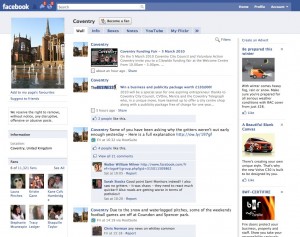There was all sorts of excitement yesterday with the news that yet another Council has reacted to the fact that some of their staff spend some of their time using social networks.
This from Arun on LocalGov.co.uk:
Staff at Portsmouth City Council have been banned from using social networking sites after a local paper investigation revealed they spent up to 572 hours a month on Facebook.
The Freedom of Information (FoI) request from Portsmouth paper, The News, discovered that on average the council’s 4,500 staff spent 413 hours on Facebook per month.
Usage peaked in July when 572 hours – equivalent to 71 working days – were spent on the site.
Following the investigation council chief executive David Williams issued a council-wide ban on all social networking sites.
‘We intend to restrict Internet access to social networking sites more than at present for non-business use,’ he said.
‘Any member of staff may, under this revised policy, make a business case to have these sites unblocked.
Sigh. It must have been a slow news day, as even the BBC reported on it – and of course they phoned up those level headed folk at Taxpayers’ Alliance for a quote. Double sigh.
The approach taken by the Council in this instance is similar to action taken by other local authorities in response to the growth in the use of social networking sites across local government. Such responses are needlessly risk-averse, and threaten these organisations’ ability to use online technology to innovate.
Putting aside the fact that, on an individual basis, the time spent on social networking sites was negligible anyway, the mistake that these councils are making is to treat online interaction differently from any other form of behaviour.
Were a member of staff found to be spending working time reading a newspaper at their desk, for example, would newspapers be banned from council offices? I doubt it.
When members of staff are found to be spending lots of time sending personal emails, is the facility removed from everyone who works there? Nope.
The same could be said of chat amongst staff, whether around the water cooler, or at desks. No organisation in their right minds would attempt to enforce a ban on talking in the office.
If a member of staff is wasting time on the internet, whether on social networks or any other site, then they should of course be disciplined, but using the same code of conduct that another other time wasting incident would employ. There is nothing new about this, except for jumping on a new piece of technology and inventing new rules for it – just because it is different.
This is a management issue, and requires a management response, not a technological one. There are no sensible reasons for blocking these websites, it is a simple case of organisations both not trusting their staff to manage their time effectively and not trusting managers to manage properly.
And I haven’t even mentioned how using social networks in the workplace can actually a) increase productivity; b) be used to do interesting engagement stuff with citizens; c) make an organisation seem like the sort of place a normal person might want to work, rather than some weird, cut-off, luddite backwater.
Sharon has written a good account of this on her blog, and Shel has picked it up in the States.



